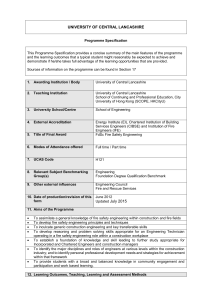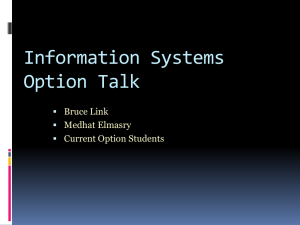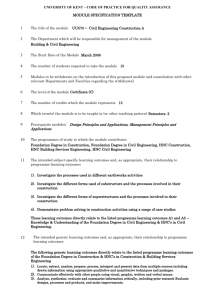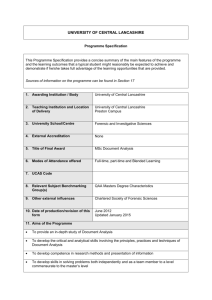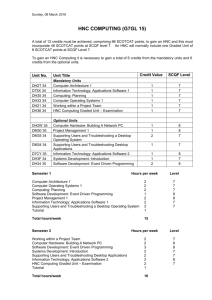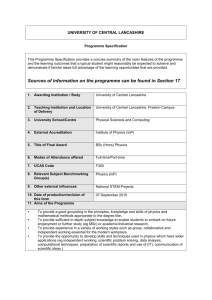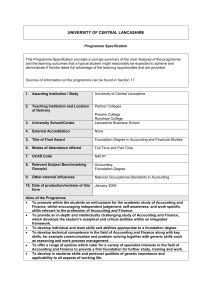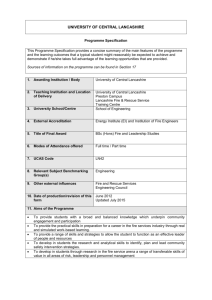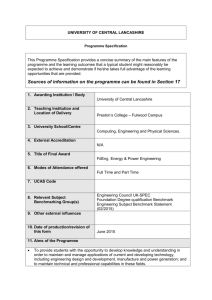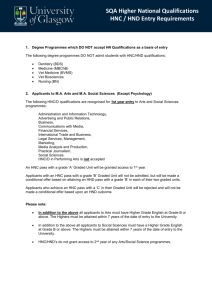HNC Electrical and Electronic Engineering (Sept 2013)
advertisement
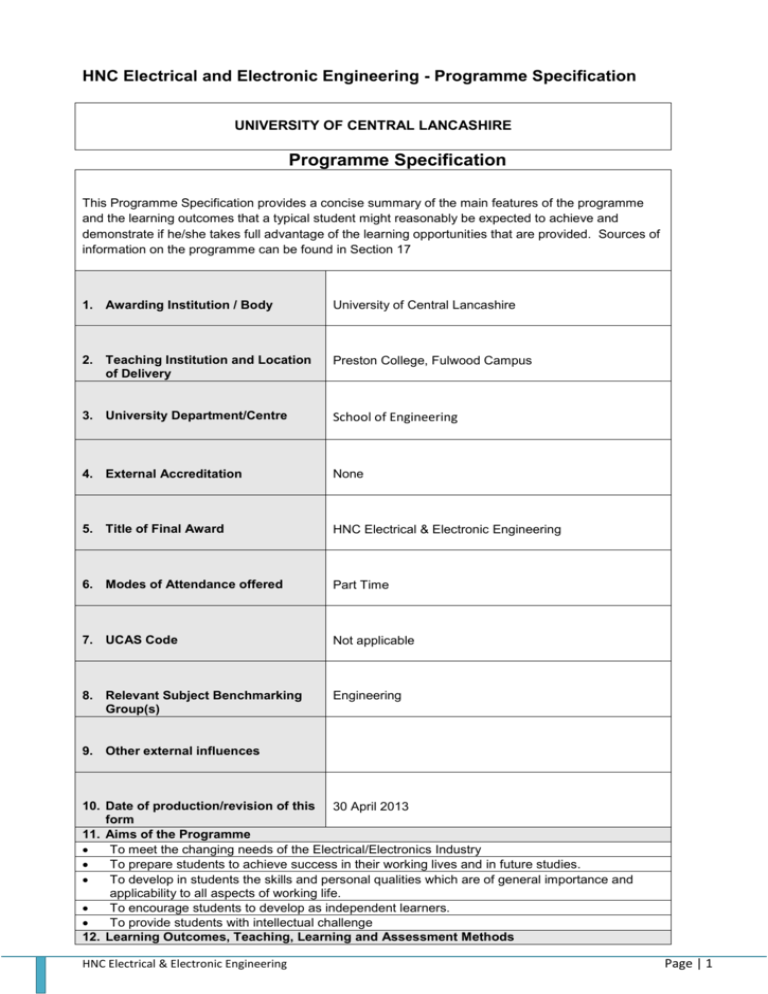
HNC Electrical and Electronic Engineering - Programme Specification UNIVERSITY OF CENTRAL LANCASHIRE Programme Specification This Programme Specification provides a concise summary of the main features of the programme and the learning outcomes that a typical student might reasonably be expected to achieve and demonstrate if he/she takes full advantage of the learning opportunities that are provided. Sources of information on the programme can be found in Section 17 1. Awarding Institution / Body University of Central Lancashire 2. Teaching Institution and Location of Delivery Preston College, Fulwood Campus 3. University Department/Centre School of Engineering 4. External Accreditation None 5. Title of Final Award HNC Electrical & Electronic Engineering 6. Modes of Attendance offered Part Time 7. UCAS Code Not applicable 8. Relevant Subject Benchmarking Group(s) Engineering 9. Other external influences 10. Date of production/revision of this 30 April 2013 form 11. Aims of the Programme To meet the changing needs of the Electrical/Electronics Industry To prepare students to achieve success in their working lives and in future studies. To develop in students the skills and personal qualities which are of general importance and applicability to all aspects of working life. To encourage students to develop as independent learners. To provide students with intellectual challenge 12. Learning Outcomes, Teaching, Learning and Assessment Methods HNC Electrical & Electronic Engineering Page | 1 A. Knowledge and Understanding A1. A2. A3. A4. A5. Describe various electronic components to the characteristic level Explain electrical engineering principles and relate them to employment situations. Perform complex calculations on electrical engineering problems Describe and evaluate how management systems have evolved to meet global markets including current legal and quality issues. Apply differential & integral calculus, trigonometry, complex numbers and matrices to a range of problems Select a microprocessor for a specific application and describe current microprocessor technologies. Teaching and Learning Methods Lectures, laboratory work , class discussions, video presentations and My Course (Web CT) Assessment methods Written assignments, end of year examinations and in-class timed assignments. B. Subject-specific skills B1. Select a suitable amplifier and power supply. Explain sequential logic and feedback systems. B2. Construct & test AC and DC circuits using simulation techniques B3. Design and solve assembly language programmes; analyse logic and control circuits B4. Design, analyse and test filter circuits, oscillators, D-A and A-D conversion techniques B5. Minimise the effects and generation of noise. Describe power electronic components. Teaching and Learning Methods Lectures, laboratory work, research and computer simulations. Assessment methods Written assignments and end of year examinations. C. Thinking Skills C1. C2. C3. C4. Analyse factors contributing to morale, review strategies and recommend action Evaluate factors in managing change, identify tools and control techniques. Consider the effect of the need for flexible workforces. Analyse and test analogue and digital circuit configurations Analyse and specify standard industrial equipment and perform power equipment calculations. Teaching and Learning Methods Lectures, laboratory work, class discussions and My Course (Web CT). Assessment methods Written assignments and end of year examinations. D. Other skills relevant to employability and personal development D1. D2. D3. Complete a realistic engineering project to specification and within a given timescale. Present the project in a professional manner (written). Give a professional oral presentation. Teaching and Learning Methods Lectures, research work. Assessment methods HNC Electrical & Electronic Engineering Page | 2 Written assignment and presentation. 13. Programme Structures* 14. Awards and Credits* Level Module Code Module Title Level 5 PT2002 PT2009 PT2021 Analogue & Digital Electronics B Industrial Studies Project 20 20 20 PT1001 Analogue & Digital Electronics A PT1007 Electrical Principles PT1014 Mathematics for Technology PT1017 Microprocessor Systems PT1018 Power Equipment 15. Personal Development Planning 20 20 20 20 20 Level 4 Credit rating Higher National Certificate Requires 160 credits including a minimum of 60 at Level 5or above Understand the factors that affect motivation and the management of change in the workplace. Develop written and verbal presentational skills 16. Admissions criteria Programme Specifications include minimum entry requirements, including academic qualifications, together with appropriate experience and skills required for entry to study. These criteria may be expressed as a range rather than a specific grade. Amendments to entry requirements may have been made after these documents were published and you should consult the University’s website for the most up to date information. Students will be informed of their personal minimum entry criteria in their offer letter. a BTEC National Award, Certificate or Diploma an Advanced Vocational Certificate of Education (AVCE) an NVQ at Level 3 an Access Course an A Level; or equivalent level qualifications. students who in the opinion of the Course Leader would benefit from the course 17. Key sources of information about the programme Preston College web site Fact Sheet Promotional literature Press Advertisements HNC Electrical & Electronic Engineering Page | 3 HNC Electrical & Electronic Engineering Page | 4 18. Curriculum Skills Map Please tick in the relevant boxes where individual Programme Learning Outcomes are being assessed Programme Learning Outcomes Module Level Code Module Title Core (C), Compulsory (COMP) or Option (O) Knowledge and understanding e.g. LEVEL 4 e.g. LEVEL 5 A1 Note: PT2002 Analogue & Digital Electronics B COMP PT2009 Industrial Studies COMP PT2021 Project COMP PT1001 Analogue & Digital Electronics A COMP PT1007 Electrical Principles COMP PT1014 Mathematics for Technology COMP PT1017 Microprocessor Systems COMP PT1018 Power Equipment COMP A2 A3 A4 Subject-specific Skills A5 B1 B2 B3 Thinking Skills B4 B5 C1 C2 C3 Other skills relevant to employability and personal development C4 D1 D2 D3 Mapping to other external frameworks, e.g. professional/statutory bodies, will be included within Student Course Handbooks 5 6
